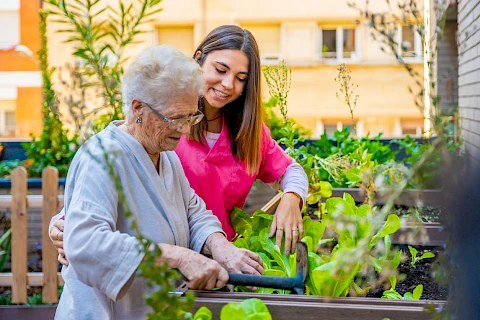
Adaptive gardening presents a wonderful opportunity for seniors to continue their love for horticulture in a way that suits their changing needs. This method of gardening provides practical solutions that allow seniors to enjoy outdoor activities without compromising comfort or safety. Gardenings' plethora of benefits that goes beyond the aesthetic appeal of a blooming garden. It can foster physical wellness, mental clarity, and a sense of fulfillment.
The Benefits of Gardening for Seniors
Gardening has several benefits for seniors, both physically and psychologically. Learn more
Physically
Physically, it acts as a low-impact exercise that can improve longevity and overall well-being. The movement associated with gardening activities such as planting, watering, and weeding helps to enhance physical strength and flexibility. It's a gentle way to stay active, improve circulation, and maintain a healthy heart.
Mentally
On a mental level, gardening can be incredibly therapeutic. It's an activity that demands focus, helping to reduce stress and anxiety. Moreover, tending to plants and watching them grow and thrive can instill a sense of pride and accomplishment, contributing significantly to mental well-being and happiness.
Adaptive Gardening Techniques
Adaptive gardening encompasses a variety of practices and tools designed to make gardening more accessible and enjoyable for seniors, such as:
Raised Beds
One such method is the use of raised beds. This technique involves elevating the garden beds to reduce the need for excessive bending and kneeling, which can be strenuous on the joints. Raised beds facilitate easier access to and maintenance of plants, enhancing the comfort and enjoyment of gardening.
Vertical Gardens
Similarly, vertical gardens are an excellent consideration for seniors. This innovative method involves growing plants upwards, on trellises or other structures, rather than in the ground. Vertical gardens not only conserve space but also lessen the physical effort required for garden maintenance.
Adaptive Tools
The choice of tools can also make a significant difference. Ergonomic tools are designed with user comfort in mind. They typically come with padded handles and are lightweight, which helps ease the strain on the hands and wrists, making gardening more accessible and less physically demanding.
Tips for Seniors to Enjoy Gardening
Approaching gardening in senior years requires some smart strategies, including:
Start Small
One recommendation is to start small. A smaller garden is easier to manage and less physically demanding. Consider starting with a few plants or a small planter and gradually expanding as you gain confidence and strength.
The Right Plants
Choosing plants that are easy to care for can also reduce the amount of physical work required. Perennial plants, for instance, are a good option because they return annually with minimal maintenance.
Seek Professional Help
Furthermore, don't hesitate to hire professional help for more strenuous tasks. Hiring a professional to prepare the soil or install raised beds can make the gardening experience more pleasant and feasible.
Senior Helpers Springfield-Manassas, VA, Helps Seniors With Gardening
Adaptive gardening offers a joyful and beneficial way for seniors to continue their love for horticulture. Utilizing raised beds, vertical gardens, ergonomic tools, and a thoughtful approach allows gardening to stay enjoyable regardless of age.
Therefore, we encourage all seniors residing in Ashburn, Burke, Fairfax Station, Fort Belvoir, and Woodbridge to embrace adaptive gardening and experience its multitude of benefits. For more information on making gardening a safe and enjoyable hobby or any help you may need, feel free to reach out to Senior Helpers Springfield-Manassas, VA.